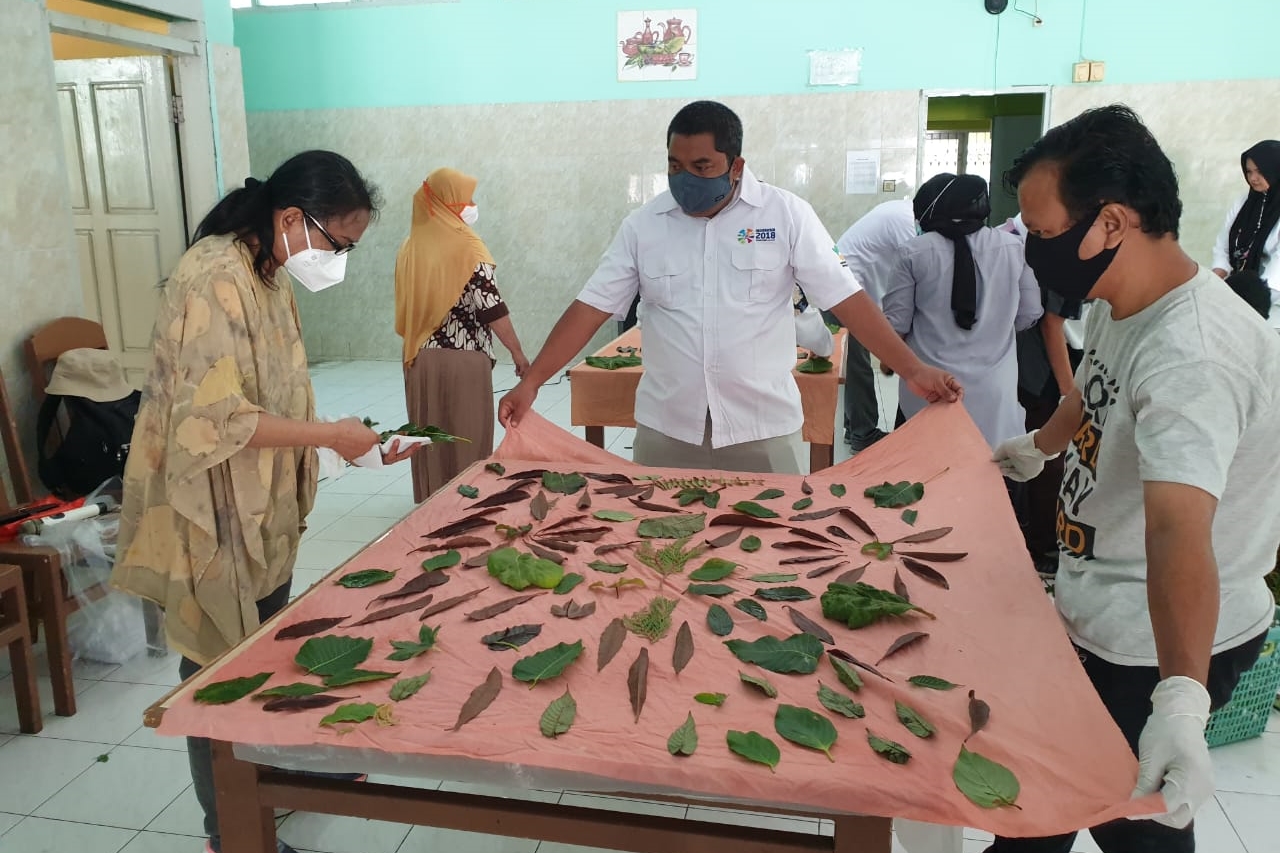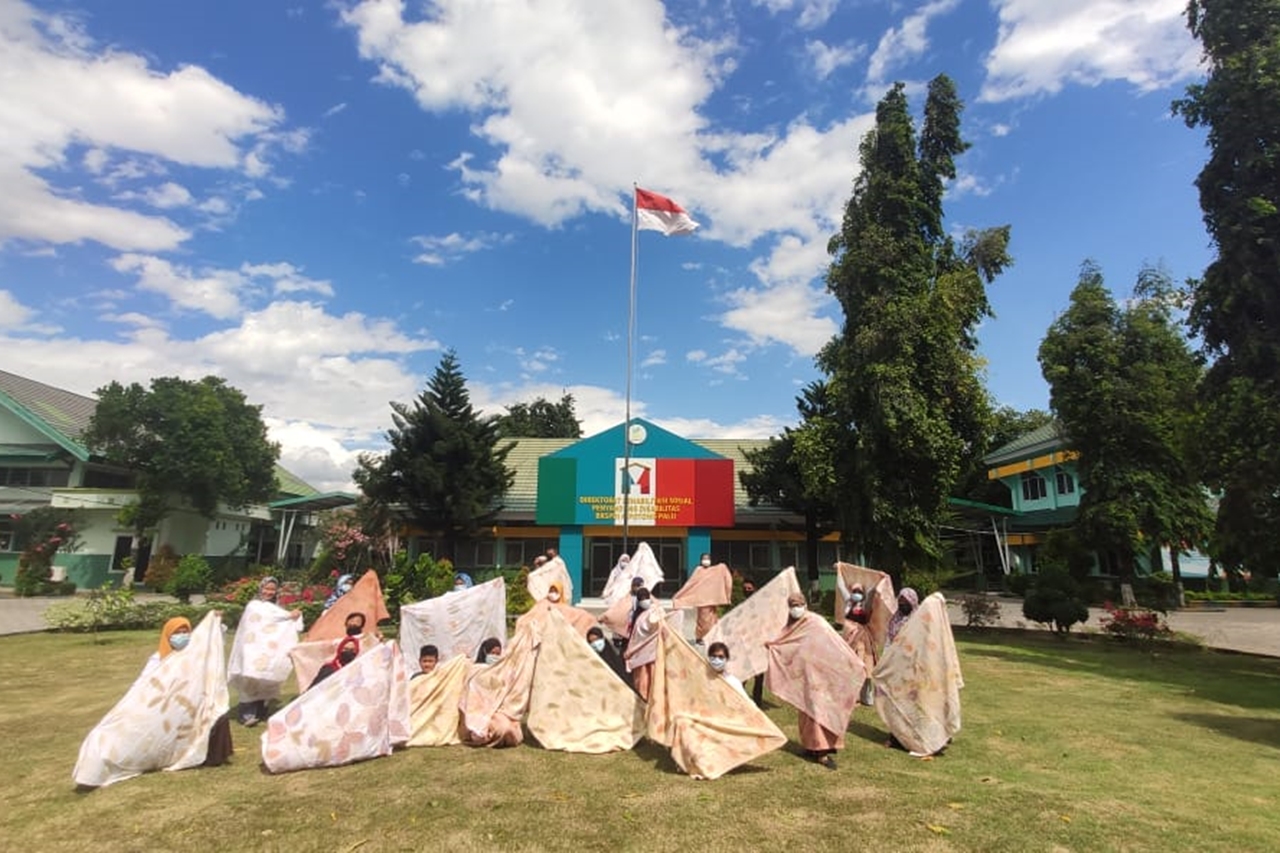Writer :
Humas Balai Disabilitas Nipotowe Palu
Editor :
David Myoga
Translator :
Intan Qonita N
PALU (February 11, 2021) - It is certainly difficult for them to access higher education, especially getting a job. As a result, the cycle of poverty is increasingly reluctant to be cut off from intellectual disabilities due to lack of access to skills and support obtained by intellectual disabilities.
Recognizing the limitations and discrimination experienced by intellectual disabilities, the "Nipotowe" Disability Center Palu, as the Technical Implementation Unit of the Indonesian Ministry of Social Affairs, continues to innovate in providing therapy so that intellectual disabilities are empowered and able to support themselves and their families.
Still in the same month, the "Nipotowe" Disability Center in Palu again innovated to develop Ecoprint entrepreneurship for intellectual disabilities, after previously providing entrepreneurship training on Paper Recycling therapy.
Ecoprint comes from the word Eco / ecosystem (nature) and print which means to print. Ecoprint is the art/technique of transferring leaf/flower tannins to the surface of cloth or paper.
"This ecoprint is a solution for those with intellectual disabilities to be independent and earn a decent income because the quality is good," said Syaiful.
For the upper middle class economy and the fashion world, ecoprint is in great demand because of the uniqueness of the motif fabric and the environmentally friendly production process. No wonder that the current ecoprint results are very exclusive and expensive.
"Certainly, where there is quality, there is a price, and this will encourage the economy with intellectual disabilities to escape the cycle of poverty," explained Syaiful.
Syaiful Samad was enthusiastic to see the results of the ecoprint training held at "Nipotowe" Center for 2 days (9-10 February 2021), even showing that it was of marketable quality. He plans that this ecoprint will become an icon of intellectual disability businesses in Central Sulawesi.
"We carry out this ecoprint because the materials are easy to get, easy to do and environmentally friendly. Therefore, this Ecoprint will become an icon of intellectual disability businesses in Central Sulawesi," said Syaiful.
Arini Soewarli as a resource for the Ecoprint training, who is also involved in the world of Healthy Food Products, as well as an activist for empowerment and anti-discrimination against people living with HIV (PLHIV), admitted that she was very surprised to see the ecoprint work made by the participants she trained at the "Nipotowe" Center.
Recognizing the limitations and discrimination experienced by intellectual disabilities, the "Nipotowe" Disability Center Palu, as the Technical Implementation Unit of the Indonesian Ministry of Social Affairs, continues to innovate in providing therapy so that intellectual disabilities are empowered and able to support themselves and their families.
Still in the same month, the "Nipotowe" Disability Center in Palu again innovated to develop Ecoprint entrepreneurship for intellectual disabilities, after previously providing entrepreneurship training on Paper Recycling therapy.
Ecoprint comes from the word Eco / ecosystem (nature) and print which means to print. Ecoprint is the art/technique of transferring leaf/flower tannins to the surface of cloth or paper.
"This ecoprint is a solution for those with intellectual disabilities to be independent and earn a decent income because the quality is good," said Syaiful.
For the upper middle class economy and the fashion world, ecoprint is in great demand because of the uniqueness of the motif fabric and the environmentally friendly production process. No wonder that the current ecoprint results are very exclusive and expensive.
"Certainly, where there is quality, there is a price, and this will encourage the economy with intellectual disabilities to escape the cycle of poverty," explained Syaiful.
Syaiful Samad was enthusiastic to see the results of the ecoprint training held at "Nipotowe" Center for 2 days (9-10 February 2021), even showing that it was of marketable quality. He plans that this ecoprint will become an icon of intellectual disability businesses in Central Sulawesi.
"We carry out this ecoprint because the materials are easy to get, easy to do and environmentally friendly. Therefore, this Ecoprint will become an icon of intellectual disability businesses in Central Sulawesi," said Syaiful.
Arini Soewarli as a resource for the Ecoprint training, who is also involved in the world of Healthy Food Products, as well as an activist for empowerment and anti-discrimination against people living with HIV (PLHIV), admitted that she was very surprised to see the ecoprint work made by the participants she trained at the "Nipotowe" Center.
"There were 30 participants who were trained and all of them were enthusiastic about learning. I am satisfied to see the results of the ecoprint work made by the participants," said Arini.
Arini Soewarli explained that this ecoprint was made by printing with materials found in the natural environment. The materials used in the form of leaves, flowers, stems and even twigs, which are widely available in the environment around people with disabilities. The process is also not difficult for intellectual disability.
"The ecoprint production process is very easy, and simple because it is made by printing with materials found in the natural environment, so it can be carried out by intellectual disabilities," explained Arini Soewarli.
She also said that ecoprint can boost the intellectual disability economy because ecoprint fabrics are expensive.
"Ecoprints cost hundreds of thousands, some even millions, because the coloring techniques and motifs create unique and attractive visuals. Apart from being expensive, ecoprints do not cause other problems, and do not inherit environmental pollution," added Arini Soewarli.
Arini Soewarli, who initially made ecoprints a hobby, ended up having experience in knowing the types of plants and leaves that have strong tunning to be used as ecoprint materials. Through her expertise, Arini Soewarli helps a lot of people who often experience discrimination in getting a job through ecoprint empowerment activities.
"I hope intellectual disabilities can overcome stigma and discrimination through this ecoprint entrepreneurship, because that's the reason I want to come to train," said Arini. She also encouraged participants to continue exploring with natural materials around them without bringing in materials from outside the region.
Arini Soewarli explained that this ecoprint was made by printing with materials found in the natural environment. The materials used in the form of leaves, flowers, stems and even twigs, which are widely available in the environment around people with disabilities. The process is also not difficult for intellectual disability.
"The ecoprint production process is very easy, and simple because it is made by printing with materials found in the natural environment, so it can be carried out by intellectual disabilities," explained Arini Soewarli.
She also said that ecoprint can boost the intellectual disability economy because ecoprint fabrics are expensive.
"Ecoprints cost hundreds of thousands, some even millions, because the coloring techniques and motifs create unique and attractive visuals. Apart from being expensive, ecoprints do not cause other problems, and do not inherit environmental pollution," added Arini Soewarli.
Arini Soewarli, who initially made ecoprints a hobby, ended up having experience in knowing the types of plants and leaves that have strong tunning to be used as ecoprint materials. Through her expertise, Arini Soewarli helps a lot of people who often experience discrimination in getting a job through ecoprint empowerment activities.
"I hope intellectual disabilities can overcome stigma and discrimination through this ecoprint entrepreneurship, because that's the reason I want to come to train," said Arini. She also encouraged participants to continue exploring with natural materials around them without bringing in materials from outside the region.
Share :
 English
English
 Bahasa
Bahasa


